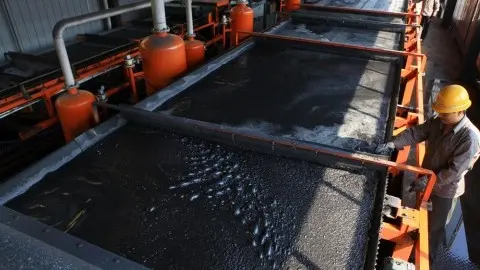How will Indonesia’s elections results impact the economy?
Growth in Indonesia has hovered about the 5% level since 2016 and going forward its trajectory will largely depend on who wins the elections next week. For the second time, President Joko Widodo will face off Prabowo Subianto, so what can we expect from the economy under each candidate?
Take two: Jokowi vs Prabowo (again in 2019)
Indonesia will hold elections next week with incumbent President Joko Widodo, also known as Jokowi widely expected to secure a second five-year term. Latest polls show Jokowi leading his second-time challenger, the former general and now businessman, Prabowo Subianto, who Jokowi defeated in the previous election.
Here’s a quick look at what we can expect from each candidate in terms of their economic policies.
Jokowi to push investment with an eye on globalisation
President Jokowi’s economic platform rests on his push to improve the economy through investments in infrastructure in a bid to gain global competitiveness and lower Indonesia’s reliance on minerals and other resources exports. Jokowi hopes for Indonesia to move up higher-value-added ventures to help provide jobs through high technology industrialisation.
However, his push for investments and infrastructure has resulted in both current account and fiscal deficits. The president has defended the 'twin deficits', saying investments would eventually boost growth and help the economy reverse these deficits down the line. His push for investments has also contributed to Indonesia's strengthening ties with China.
Athough we can't see any near-term respite from the twin-deficit problem, the long-term prospects for Indonesia remain positive. A greater emphasis on infrastructure, health and education investment should help wean itself off lower-value added exports and evolve into a more dynamic economy
At the same time, Jokowi has chosen to boost imports of basic foodstuffs to help stabilise prices - a move that seems to have worked in keeping domestic price growth in check, and inflation at the lower end of the central bank's 2.5 - 4.5% target range. Meanwhile, in response to his challenger’s bid to lower corporate and personal taxes, he's also pledged to look into cutting taxes further, given that over the course of his term, he's effectively given tax breaks to lower income households.
If Jokowi is elected to a second term, we are likely to see the country push on with his infrastructure and investment plans. Inflation is likely to remain in check given Jokowi’s program to import basic foodstuffs, but wider current account and fiscal deficits will remain the key overhangs on the Indonesian rupiah (IDR). Besides existing import curbs to rein in the current deficit, including consideration of increasing the biodiesel blend in local fuel, any future dip in global oil prices may help the government cut back on fuel subsidies.
Although there is unlikely to be any near-term respite from the twin-deficit problem, the long-term prospects for the economy remain positive. A greater emphasis on infrastructure, health and education investment will all help Indonesia wean itself off dependence on lower-value added exports and evolve into a more dynamic economy.
Prabowo wants to take Indonesia back to its core strengths
The challenger Prabowo is making an aggressive bid to lower both corporate and income tax as he criticises the president's push outwards. If he manages to deliver this, it will boost the consumer's purchasing power and help the economy become more competitive and an attractive destination for foreign investment. Although lowering taxes are seen to bloat the country’s deficit, Prabowo vows to boost the efficiency of the tax collecting machinery and achieve more revenue via consumption taxes.
With less than a week to go before Indonesians head to the polls, Jokowi remains comfortably in the lead, but we've seen our fair share of election surprises in recent years
Unlike Jokowi's globalisation drive, Prabowo seems to preach a return to Indonesia’s core domestic strengths sourcing both food and energy domestically. This is why he's been critical of Jokowi’s foods and oil importing policy to keep inflation low. Prabowo is encouraging a push inwards by helping local farmers via subsidies, while also planning to secure renewable energy via Indonesia's vast forest lands. Prabowo has also criticised his competitor's infrastructure drive because of the pressure it exerts on deficits, as well as publically denouncing ties with China.
However, it remains unclear, how Prabowo hopes to achieve industrialisation without pushing for investments, which may result in lower deficits but also slower growth. He may currently trail in the surveys leading up to the polls, but we won't rule out a surprise victory.
With less than a week to go before Indonesians head to the polls, Jokowi remains comfortably in the lead, but we've seen our fair share of election surprises in recent years.
Although the candidates are similar in their drive for industrialisation, increasing or preserving purchasing power and job creation, the two differ in their approach to these goals. The economy will continue to chug along at the current 5% handle, and we'll have to see who the people choose to get the economy jump-started through reforms.
Tags
IndonesiaDownload
Download article
18 April 2019
In case you missed it: China to the rescue? This bundle contains 10 articles"THINK Outside" is a collection of specially commissioned content from third-party sources, such as economic think-tanks and academic institutions, that ING deems reliable and from non-research departments within ING. ING Bank N.V. ("ING") uses these sources to expand the range of opinions you can find on the THINK website. Some of these sources are not the property of or managed by ING, and therefore ING cannot always guarantee the correctness, completeness, actuality and quality of such sources, nor the availability at any given time of the data and information provided, and ING cannot accept any liability in this respect, insofar as this is permissible pursuant to the applicable laws and regulations.
This publication does not necessarily reflect the ING house view. This publication has been prepared solely for information purposes without regard to any particular user's investment objectives, financial situation, or means. The information in the publication is not an investment recommendation and it is not investment, legal or tax advice or an offer or solicitation to purchase or sell any financial instrument. Reasonable care has been taken to ensure that this publication is not untrue or misleading when published, but ING does not represent that it is accurate or complete. ING does not accept any liability for any direct, indirect or consequential loss arising from any use of this publication. Unless otherwise stated, any views, forecasts, or estimates are solely those of the author(s), as of the date of the publication and are subject to change without notice.
The distribution of this publication may be restricted by law or regulation in different jurisdictions and persons into whose possession this publication comes should inform themselves about, and observe, such restrictions.
Copyright and database rights protection exists in this report and it may not be reproduced, distributed or published by any person for any purpose without the prior express consent of ING. All rights are reserved.
ING Bank N.V. is authorised by the Dutch Central Bank and supervised by the European Central Bank (ECB), the Dutch Central Bank (DNB) and the Dutch Authority for the Financial Markets (AFM). ING Bank N.V. is incorporated in the Netherlands (Trade Register no. 33031431 Amsterdam).


